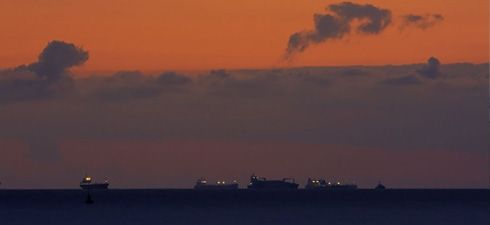Last week when the weather was good, most of the tiny ships you could see dotting the horizon on the coast of Rotterdam were carrying enough fuel to fill five million average sized cars. Virtually all of them were supertankers loaded with two million barrels of of oil. On 19 June, there were eight supertankers outside Europe's busiest port. They could have docked in less than an hour, but their captains had received orders to drop anchor off the coast — and with good reason. The loading docks were full, so too were the storage tanks — and even more importantly, the price per barrel did not offer much incentive to sell.
In describing this unusual situation, financial analysts speak of a “contango," which occurs when the spot price paid on delivery is less than the price offered by futures contracts (obtained by buying a barrel today and pledging to deliver at a future date). The opposite market condition is more common, because in general markets will offer better prices to buyers who are willing to pay in advance.
In the event of a “contango,” it makes sense to delay the unloading of cargoes. The Dutch are fully aware of this, especially since storage facilities on dry land are now filled to the brim. Under normal circumstances, these facilities can take in up to 12.8 million cubic metres of oil, or the equivalent of 80 million barrels — a quantity which the dock workers explain is enough to supply all of the EU's 27 member states for a period of five days. The owners of tanker cargoes are hoping to hold on to their stocks to avoid selling at a low price — and the storage management companies, like Eurotank and Oiltanking, are making a killing in a market where they do not hesitate to demand exorbitant fees.
Last February, futures prices for oil were up to 8 dollars more than spot prices. Today, the differential is around a dollar. The trend is mainly due to a reduction in demand caused by the economic crisis. Over the last few months, international benchmark prices rose to around 70 dollars, an increase of almost 90% over the January level. According to the Italian Oil Union, the rise was prompted by a renewal of interest in the oil industry which anticipates a resurgence in the demand for energy.
A majority of analysts are expecting a small increase in crude oil. Obviously, if the price per barrel declined, it would result in lower petrol and diesel prices (one barrel of oil produces about 100 litres of these fuels). But for that to happen, the oil companies would have to forgo some of the potential profit from their current cargoes. Unfortunately, this scenario appears to be increasingly unlikely: and every supertanker anchored at sea further reduces the probability of a fall in the price to consumers.
With the summer coming on, Europe has been swamped by a tide of black gold. According to the International Energy Agency (IEA) , between 100 and 150 million barrels were immobilised at sea in May. Last week in Rotterdam, it was reported that 28 supertankers were waiting off the Dutch coast, and only a quarter of them were empty.
Although the the amount of oil stocked at sea can often reach 85 million barrels, as was the case in the port on the New Meuse in March, the current consensus is that the contango effect has never been more prevalent. Oil field operators dod not want to sell; oil companies are buying all they can on the spot price market and making large profits by selling it on in the form of futures; and the flow of crude to refineries has all but come to a halt. When the situation returns to normal, the oil that has been held hostage will emerge on the market, prices will finally fall, and the supertankers will no longer be a feature of the view from the Dutch coast.
Was this article useful? If so we are delighted!
It is freely available because we believe that the right to free and independent information is essential for democracy. But this right is not guaranteed forever, and independence comes at a cost. We need your support in order to continue publishing independent, multilingual news for all Europeans.
Discover our subscription offers and their exclusive benefits and become a member of our community now!












